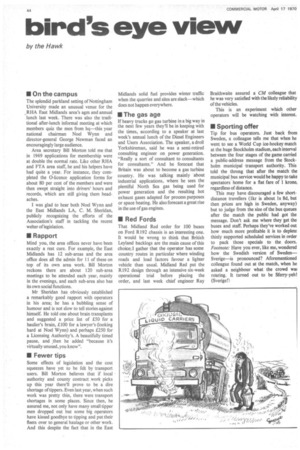bird's eye view
Page 46

If you've noticed an error in this article please click here to report it so we can fix it.
by the Hawk • On the campus
The splendid parkland setting of Nottingham University made an unusual venue for the RHA East Midlands area's agm and annual lunch last week. There was also the traditional after-lunch informal meeting at which members quiz the men from hq—this year national chairman Noel Wynn and director-general George Newman faced an encouragingly large audience.
Area secretary Bill Morton told me that in 1969 applications for membership were at double the normal rate. Like other RHA and FTA area staff, he and his helpers have had quite a year. For instance, they completed the 0-licence application forms for about 80 per cent of the members and were then swept straight into drivers' hours and records, which are still giving them headaches.
I was glad to hear both Noel Wynn and the East Midlands LA, C. M. Sheridan, publicly recognizing the efforts of the Association's staff in tackling the recent welter of legislation.
• Rapport
Mind you, the area offices never have been exactly a rest cure. For example, the East Midlands has 12 sub-areas and the area office does all the admin for 11 of these on top of its own area work. Bill Morton reckons there are about 120 sub-area meetings to be attended each year, mainly in the evenings, and each sub-area also has its own social functions.
Mr Sheridan has obviously established a remarkably good rapport with operators in his area; he has a bubbling sense of humour and is not slow to tell stories against himself. He told one about brain transplants and suggested a price list of £50 for a haulier's brain, £100 for a lawyer's (looking hard at Noel Wynn) and perhaps £250 for a Licensing Authority's. A beautifully timed pause, and ,then he added "because it's virtually unused, you know".
• Fewer tips
Some effects of legislation and the cost squeezes have yet to be felt by transport users. Bill Morton believes that if local authority and county contract work picks up this year there'll prove to be a dire shortage of tippers. Even last year, when such work was pretty thin, there were transport shortages in some places. Since then, he assured me, not only have many small tipper men dropped out but some big operators have kissed goodbye to tipping and put their fleets over to general haulage or other work. And this despite the fact that in the East Midlands solid fuel provides winter traffic when the quarries and sites are slack—which does not happen everywhere.
• The gas age
If heavy trucks go gas turbine in a big way in the next few years they11 be in keeping with the times, .according to a speaker at last week's annual lunch of the Diesel Engineers and Users Association. The speaker, a droll Yorkshireman, said he was a semi-retired consulting engineer on power generation. "Really a sort of consultant to consultants for consultants." And he forecast that Britain was about to become a gas turbine country. He was talking mainly about industrial applications, where he sees the plentiful North Sea gas being used for power generation and the resulting hot exhaust gases adapted for process purposes or space heating. He also forecast a great rise in the use of gas engines.
• Red Fords
That Midland Red order for 100 buses on Ford R192 chassis is an interesting one. It would be wrong to think that British Leyland backlogs are the main cause of this choice;1 gather that the operator has some country routes in particular where winding roads and load factors favour a lighter vehicle than usual. Midland Red put the R192 design through an intensive six-week operational trial before placing the order, and last week chief engineer Ray
Braithwaite assured a CM colleague that he was very satisfied with the likely reliability of the vehicles.
This is an experiment which other operators will be watching with interest.
• Sporting offer
Tip for bus operators. Just back from Sweden, a colleague tells me that when he went to see a World Cup ice-hockey match at the huge Stockholm stadium, each interval between the four stages of the game carried a public-address message from the Stockholm municipal transport authority. This told the throng that after the match the municipal bus service would be happy to take spectators home for a fiat fare of 1 krone, regardless of distance.
This may have discouraged a few shortdistance travellers (1kr is about 1 s 8d, but then prices are high in Sweden, anyway) but to judge from the size of the bus queues after the match the public had got the message. Don't ask me where they get the buses and staff. Perhaps they've worked out how much more profitable it is to deplete thinly supported scheduled services in order to pack those specials to the doors. Footnote: Have you ever, like me, wondered how the Swedish version of SwedenSverige—is pronounced? Aforementioned colleague found out at the match, when he asked a neighbour what the crowd ww. roaring. It turned out to be Sferry-yeh! (Sverige!)












































































































